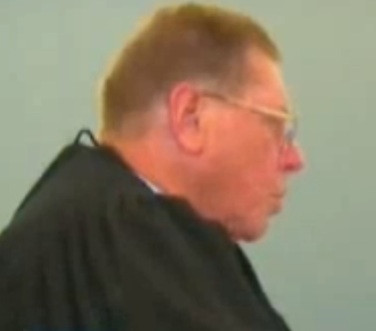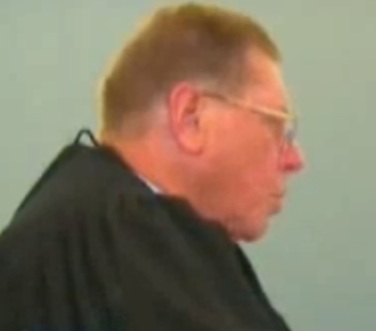The fate of the White Pine County Commission recall drive lies in the hands of a retired Nevada District Court Judge with a reputation for setting precedent.
Senior Nevada Judge Charles Thompson is expected to rule this week on various motions related to the recall drive against County Commissioners John Lampros and Mike Lemich and the defamation suit the commissioners subsequently filed against recall organizers James Adams, Timothy McGowan and Cheryl Ann Noriega.
According to White Pine County Clerk Lin Burleigh the are several motions and several options before the judge.
“From what I understand he can throw out the defamation suit, keep the defamation suit or throw out the defamation suit and then order the recall process to begin all over again,” Burleigh said. “Obviously the recall supporters would prefer the last.
 Last week the Advocate reported that recall supporters have asked the courts to extend their October 8th deadline to get 821 signatures needed to force a recall election of White Pine County Commissioners John Lampros and Mike Lemich.
Last week the Advocate reported that recall supporters have asked the courts to extend their October 8th deadline to get 821 signatures needed to force a recall election of White Pine County Commissioners John Lampros and Mike Lemich.
“From what I heard it is looking pretty bad,” said one source who spoke on the condition of anonymity. “They had some success in the beginning but a lot less now. Some people said they would sign it but are afraid they might get sued.”
The fear of being sued was in reference to a defamation suit filed by Lemich and Lampros against recall organizers James Adams, Timothy McGowan and Cheryl Ann Noriega over what the suit described as blatant falsehoods the three wrote in the recall petition statement.
“I don’t know if this has ever been used before,” said Ely attorney Richard Sears who represents both men. “But the statements in the recall petitions were so obviously false that both my clients felt they had no choice but to file the lawsuits.”
 Apart from the merits of either the defamation suits or the recall petition the lawsuits themselves open some very interesting and complex legal issues. First of all there is the question of constitutionality and the separation of powers. Recall petitions are part and parcel of the electoral process for either the executive or legislative office holder. By going to the courts to rule on whether a claim on a petition is true or false rather than the voters, Lampros and Lemich may have broached a border that isn’t to be crossed.
Apart from the merits of either the defamation suits or the recall petition the lawsuits themselves open some very interesting and complex legal issues. First of all there is the question of constitutionality and the separation of powers. Recall petitions are part and parcel of the electoral process for either the executive or legislative office holder. By going to the courts to rule on whether a claim on a petition is true or false rather than the voters, Lampros and Lemich may have broached a border that isn’t to be crossed.
On the other hand if Sears is correct and the claims made in the recall petition are patently false the authors could be held responsible whether they are successful in forcing a recall election or not.
And it may not only be the authors.
“I really haven’t looked into it.” Sears said. “It would be an interesting point if anyone who signed the petitions could also be named in the defamation suit.”
That speculation found its way into a counter suit filed by the recall organizers that the defamation suit was a Strategic lawsuit against public participation (SLAPP) suit.
According to Wikipedia: Strategic lawsuit against public participation (SLAPP) is a lawsuit that is intended to censor, intimidate, and silence critics by burdening them with the cost of a legal defense until they abandon their criticism or opposition.
 The typical SLAPP plaintiff does not normally expect to win the lawsuit. The plaintiff’s goals are accomplished if the defendant succumbs to fear, intimidation, mounting legal costs or simple exhaustion and abandons the criticism. A SLAPP may also intimidate others from participating in the debate. A SLAPP is often preceded by a legal threat. The difficulty is that plaintiffs do not present themselves to the Court admitting that their intent is to censor, intimidate or silence their critics. Hence, the difficulty in drafting SLAPP legislation, and in applying it, is to craft an approach which affords an early termination to invalid abusive suits, without denying a legitimate day in court to valid good faith claims.
The typical SLAPP plaintiff does not normally expect to win the lawsuit. The plaintiff’s goals are accomplished if the defendant succumbs to fear, intimidation, mounting legal costs or simple exhaustion and abandons the criticism. A SLAPP may also intimidate others from participating in the debate. A SLAPP is often preceded by a legal threat. The difficulty is that plaintiffs do not present themselves to the Court admitting that their intent is to censor, intimidate or silence their critics. Hence, the difficulty in drafting SLAPP legislation, and in applying it, is to craft an approach which affords an early termination to invalid abusive suits, without denying a legitimate day in court to valid good faith claims.
Accprding to recent cases Thompson is neither afraid to to break precedent not to set new ones and he often rules for the underdog.
In 2008 he ruled in favor of then Democratic Presidential hopeful Dennis Kucinch and order the dark horse candidate be allowed to participate in the presidentil debate against the wishes of political heavy weights Hilary Clinton and Barack Obama.
More recently in 2012 Thompson Clark District Attorney Steve Wolfson from prosecuting a felony drunken driving case after finding “that a true and extreme conflict of interest exists” between Wolfson and the defendant, a former client.
The dueling lawsuits may have also turned prospective signers off from joining the petition.
Even before the lawsuits were filed getting enough signatures to force a recall was considered no mean feat.
Filing for a recall is one thing, getting enough valid signatures to force a recall election is quite another.
 According to County Clerk Lin Burleigh recall supporters must garner at 821 signatures of White Pine County voters who actually vote in the 2010 election.
According to County Clerk Lin Burleigh recall supporters must garner at 821 signatures of White Pine County voters who actually vote in the 2010 election.
While not impossible the task is far from easy and perhaps made even more difficult because unlike the privacy of the voting booth the names on a recall petition are public record.
“They will have to get the signatures and after they submit them we have to verify them,” Burleigh added. “ My staff is ready but if they do not get the amount during the time allowed there will not be a recall election.”
While the process is intended to be difficult, should the recall drive be successful simple math suggests it would be very hard for either commissioner to win a recall election. If the two commissioners were force into a recall election both men would have to carry more than two thirds of the electorate that did not sign the petition to win, an obstacle perhaps even larger than the one now facing their opponents.

